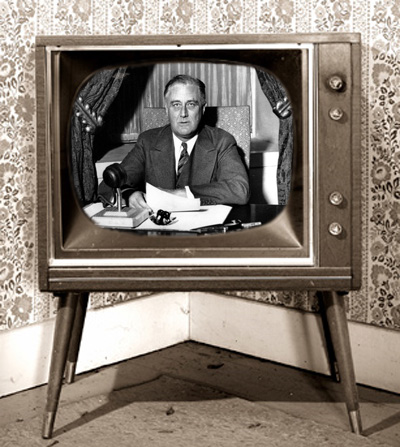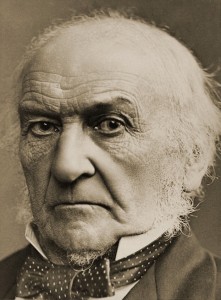Counter Factual: Pre-War Politicians and Television October 20, 2015
Author: Beach Combing | in : Contemporary, Modern , trackbackA modern politician needs to be convincing on television. That these qualities matter was famously demonstrated in the first debate between Richard Nixon and John F. Kennedy in 1960, where radio listeners believed that Nixon had won the contest, but television watchers, shocked by Nixon’s five o’clock shadow, claimed that Kennedy had beaten his Republican foe. The skills needed to speak effectively in an assembly or to speak on the radio (particularly in a speech on the radio as was typical until the 1960s) were very similar. The skills needed to make a good impression on TV were rather different: photogenic, intimate, folksy, coherent, ‘sincere’… And some of the best television performers are not great orators: e.g. Tony Blair. Yet today performance on television is far more important than your ability to rabble rouse in the market square. Beach had a long and very pleasant journey on the train the other day and found himself wondering what great politicians of the past would have never made it because of their inability to ‘do’ television. Here’s an initial list of three major politicians that would have been struck from the ranks of fame: other suggestions (or disagreements) drbeachcombing AT yahoo DOT com
Gladstone: Queen Victoria famously said that Gladstone ‘always addresses me as if I were a public meeting’. Television demands intimacy. Gladstone also had something a little saliva-flecked and wide-eyed about him: Margaret Thatcher had something similar but could, at least, temporarily descend into normality. To the voting Liberal public, this Gladstonian ‘sincerity’ made him a paladin: but on television he would have come across as a ‘crazy’, a word often applied to him by his knowing contemporaries. You can just about see it in some photographs of the man (his gaze particularly) who would never have been Prime Minister had there been television.
Lincoln: An effective if not brilliant speaker and warm in private Lincoln seems to have had everything necessary to become a great television performer. What comes though from so many descriptions is his awkwardness (sometimes something like shyness?), his unusual elongated body and his sad face. It is not exactly a PR man’s dream, is it? Beach would also guess that his very care in thought and expression (something always there in his writing and his speeches) would have worked against him in the end. He would have impressed viewers, but have been dismissed as wooden and not ‘of the people’.
https://youtu.be/tTXhez2mNmM
Mussolini: Mussolini spoke at people, particularly crowds. He raved, he roared. He was strangely effective in this and carried (if you can forget the pitiful coda to his career) conviction and gave a sense of energy. It is difficult to believe that old Muss would have made the transition well to television. He had two public registers: demagogue or clown. On television he would have seemed delirious or absurd. If you are skeptical watch how he comes across on his only English language recording. Is television a prophylactic against dictators, then? Beach would guess that Hitler, who had a greater range of registers, would have worked television terrifyingly well ‘Ach, Oprah, let me be frank with you…’
And who would have done even better? Both Roosevelts (though for different reasons), Disraeli, William Pitt the Younger, Lloyd George (who would have been brilliant), and perhaps Woodrow Wilson (?) if he could have relaxed a little.
30 Oct: Dennis L writes ‘in regards to politicians who would have been foiled by television. Your notes brought to mind another type of commentator who was brought down by the transition.Walter Winchell was an extremely well know, popular radio gossip in america. He had a great following during the 1930s and 40s and his show was highly rated. When he tried television, his style was a disaster. During his reading of the news and gossip, Winchell was constantly in motion. The constant fidgeting was no problem on radio since only his voice was broadcast, but on television he came across as an uncontrollable wild man.’
Bit like those poor silent movie stars with awful voices…
Thanks, Dennis!





